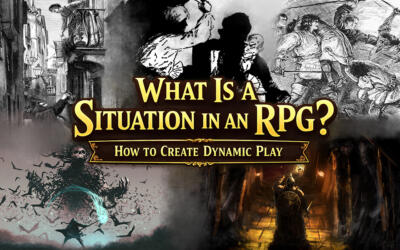 Over the years I’ve had the privledge of running sessions where most of the players were new to the hobby. In this column, we’ll take a look at some strategies for planning out that first session. The goal in planning such a session is to showcase some of the essential features of the system, while giving them a successful and enjoyable session. Much of these ideas are not original to me, but hopefully it will be helpful to have them here, all in one place.
Over the years I’ve had the privledge of running sessions where most of the players were new to the hobby. In this column, we’ll take a look at some strategies for planning out that first session. The goal in planning such a session is to showcase some of the essential features of the system, while giving them a successful and enjoyable session. Much of these ideas are not original to me, but hopefully it will be helpful to have them here, all in one place.
FOCUS ON THE ESSENTIAL ELEMENTS
When planning your session, make a list of all the essential elements of your particular game/genre. For example, if you are playing fantasy, people expect exotic monsters and spells. If it’s space opera, your game needs blaster fights, space battles, and an alien beastie or two. These “set pieces” can be used to plan the major encounters for your game. While your game session shouldn’t focus solely on action, it needs to be there. More seasoned groups don’t mind long roleplaying encounters, but that may not be the best apporach for encouraging new players.
INCLUDE SOME ROLEPLAYING THROUGHOUT
Roleplaying doesn’t come easy to most new players. Nor should it. They’ve just been handed a character sheet filled with strange information, and may not be sure about what’s to come. Since the first encounter of a session is usually a hook, try to have the NPC dangling the hook invite some questions. For example, suppose the players are being given a briefing by a Star Admiral for their mission. Have the admiral ask them (in character) if they have any questions or would like additional equipment. As GM, you can ask any quiet players if they have anything to ask or contribute as well. Kindly try to include everyone.
Don’t limit the roleplaying to just the beginning of the session. You might include intelligent foes they can capture and interrogate later in the session. They might meet a helpful wanderer in their travels, or even an injured prisoner early in the dungeon, warehouse, or crashed spaceship. These provide great opportunities for roleplaying throughout. They help make your game more than “monster, trap, monster, trap…”
MAKE IT EASY
When in doubt, err on the side of the players. Make the monsters a little easy or have opponents run away after a few rounds. The purity of the rules is less important than generating enthusiasm in new players. As you run a session, you might find that you made it a little more difficult than you planned. No problem, the players don’t know how many hit points their opponents have and you can adjust on the fly. You can do this if a battle is going too well also, though I’d limit this to the final battle. You can always stretch it out a couple more rounds to give them a satisfying conclusion.
MAKE A CHEAT SHEET
If any of the rules are a bit arcane (so to speak), you might want to provide the table with a cheat sheet or two. Also, you can include some hints on their character sheets as well (for example: “Always roll under”). These little helpful touches can greatly improve a session.
CONCLUDING THOUGHTS
Our hobby is graying a bit, but we still love it. It brings something different to our leisure time that other games and activities can’t. It’d be great to pass that on to new players to grow the hobby. Giving them positive experiences early in their gaming careers is critical for that to happen.
You can always kill their characters later.
(Cue Dread Pirate Roberts joke now).
How do you help new players have positive early exepriences? Let us know below.

















I have a group of new players. I think I am going to give them some magical utility items early in the game. This early reward should encourage them to return for more sessions. As opposed to leaving them defeated, broke and maybe dead. These would be very low level items with limited use. No flaming swords or power armor. As an example, the small bag of small glass spheres, smash one on the ground and a globe of light rises up to the ceiling. The light stays there even if they leave the room. There’s nothing like a big bright light to help you search a room and maybe give away your position to the enemy as well.
Some other not well thought out magical items include, the boxers of cool dryness, web shooting spider man style bracers, and “the bed of moss” wand.
Giving limited use magic items up front is a great idea. One option is to only give them a certain number of charges.
Also, don’t be afraid to remind players of what they have. I’ve seen new players go a whole con game saving a spell or special power, and then never use it.
Players want suspense, mystery, and danger. Tepid thrills on GM training wheels doesn’t sound like much fun to me.
There are some very good comments on my old article Introductory Games for New Roleplayers. Rafe’s suggestion of a simplified playmat style character sheet is a good one. Darrel’s practical advice to color code the dice (or use rainbow dice) makes it easy to say, “roll a d12… that’s the yellow one”.
Miri’s comment at the end of the thread is filled with good practical advice.
Scott, that was a great article. It was neat to see how you took a different approach than I did (much more nuts and bolts.) I didn’t realize your article was there, so sorry if I tread over any old ground.
Thanks for the practical advice, and the helpful comments to my article as well.
New takes are great, and it has been more than six years since that article was written. I think you did great–write what you know and want to share!
Thanks Scott. I was relieved to see that at least we took a different take on the same subject.
Thanks again!